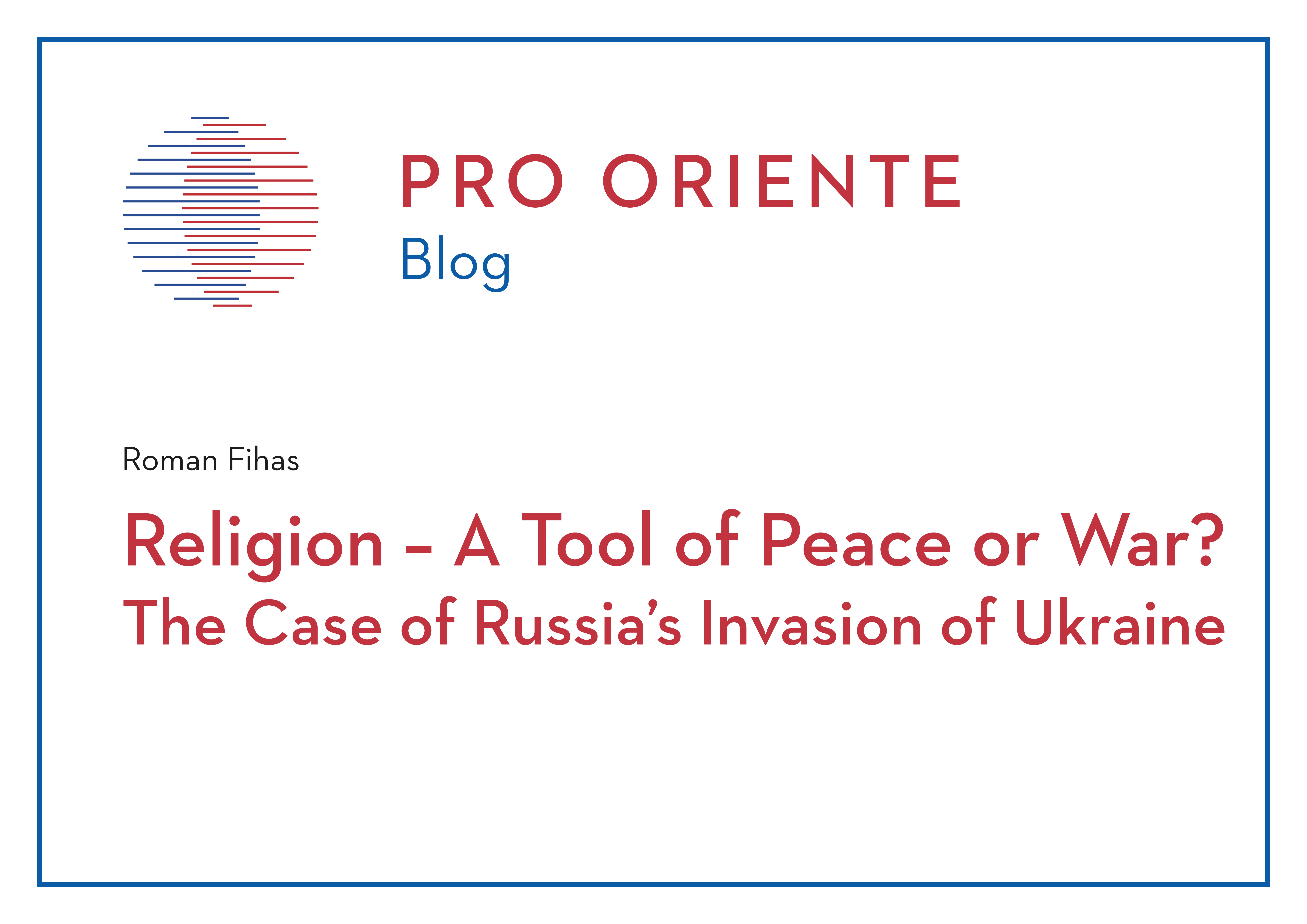Religion – A Tool of Peace or War? The Case of Russia’s Invasion of Ukraine
15. September 2025
Thema: Healing of Wounded Memories

The ongoing Russian invasion of Ukraine illustrates a sobering reality: religion, which is fundamentally meant to inspire peace, can also be weaponized to justify violence and war. In the case of Russia, religious narratives have been fused with political ideology to sanctify aggression, territorial expansion, and even genocide. For years, ideological conditioning prepared Russian society for war, embedding notions of a divine mission and a sacred Russian identity. These ideas were promoted not only through political propaganda but also with the support of religious institutions, particularly the Russian Orthodox Church (ROC). The invasion of Ukraine, therefore, is not only a military act but also an ideological crusade driven by religiously infused nationalism.
Historically, the Russian state has maintained control over religion, using it as a tool to consolidate power. From the Holy Synod system under the Tsars to Stalin's manipulation of church leadership, the Church in Russia has often been subservient to the state. Today, the ROC continues this legacy by voluntarily aligning with the Kremlin, enjoying state privileges in exchange for loyalty. Since the mid-1990s, the ROC has served as a laboratory for crafting and testing neo-imperial, quasi-religious ideologies, which were later adopted as official justifications for Russian expansionism. Ideas like “Holy Rus'” and “Russkiy Mir” (Russian World) have become theological platforms for war, where religious rhetoric masks political ambition and legitimizes violence.
For international audiences, the ROC attempts to present a facade of ecumenism, positioning itself as a defender of family values and a counterweight to Western secularism. However, this image is deeply contradictory. Internally, the ROC fosters religious exclusivism and intolerance, especially in occupied Ukrainian territories where religious freedom has been brutally suppressed. The Church’s messages serve to distract the domestic population from socio-economic issues and mobilize them under a banner of spiritual warfare. Terms such as “sacred mission”, “defender of the faith”, and “holy sacrifice” have replaced any true theology of peace. Dangerous ideas, like the absolution of sins for soldiers who die in battle, were even promoted by Patriarch Kirill at the time of Russia’s military mobilization. This blending of nationalism, militarism, and religion has given rise to a clerical fascism known as “Z-Orthodoxy”, where the war is framed as redemptive and sacred.
The Kremlin has weaponized the myth of “traditional values” as a political and theological tool, creating a framework that defines Russia as the bastion of morality against the “Satanic West”. This narrative is enshrined in state policy, reinforcing authoritarianism under a religious guise. The justification of hatred and violence as sacred duties deviates entirely from Gospel teachings. Biblical references are misused to endorse conquest and bloodshed, and Ukrainians are dehumanized through religiously charged rhetoric. Studies have revealed consistent propaganda patterns from ROC leaders, including claims that Ukrainians oppress Orthodox believers, promote terrorism, and are not truly an independent nation. Such narratives do not only rationalize war but also contribute to the genocide of the Ukrainian people by sacralizing aggression and suppressing dissent.
Religious persecution is widespread in the Russian-occupied territories of Ukraine. Non-Moscow-aligned Churches, such as the Orthodox Church of Ukraine, the Ukrainian Greek Catholic Church, and various Protestant communities, face systematic bans. Churches have been seized, destroyed, or repurposed by Russian forces. Clergy members have been arrested, tortured, or killed. In this context, religious oppression serves as both a strategic and symbolic act to eliminate Ukrainian identity. Burned churches and desecrated religious spaces have become grim symbols of this spiritual and cultural erasure.
To counter these developments, there is a pressing need for theological deconstruction of harmful ideologies. The global Christian community must come together to reject militarized theologies and denounce the sacralization of war. Ecumenical institutions have a crucial role to play in exposing the ideological perversion of faith and promoting authentic theological narratives grounded in peace, justice, and dignity. The ideology of “Russkiy Mir” has been identified by numerous theologians as not only a political danger but also a heresy – one that places the ROC outside the bounds of true Christianity. This was explicitly noted in statements by the Orthodox Church of Ukraine, the Ukrainian Greek Catholic Church, and the All-Ukrainian Council of Churches and Religious Organizations.
Ukrainian Churches, for their part, have actively resisted these narratives. Since the 1990s, the leading part of the Moscow Patriarchate in Ukraine has been a vector for Russian propaganda, promoting ideologies such as the “Triune Rus'” and supporting pro-Russian political candidates. Some radical circles of the Ukrainian Orthodox Church of the Moscow Patriarchate offered institutional cover for militant groups and even collaborated with Russian security services. These activities culminated in the religious and ideological preparation for Russia’s military actions in Crimea and Donbas. However, Ukrainian Churches have since taken a firm stance in favor of national integrity, democratic values, and interreligious cooperation. They provide humanitarian aid, foster dialogue, and promote spiritual resilience in the face of existential threats.
Finally, the role of global ecumenical actors cannot be overstated. The manipulation of religion by the Russian State and Church must be recognized as both a theological heresy and a geopolitical weapon. International religious institutions must hold the ROC accountable for its complicity in war crimes and consider its expulsion from ecumenical bodies if it continues to endorse violence. Faith must never be a shield for authoritarianism or a sword against the innocent. Instead, religion must return to its true purpose: to heal wounds, build peace, and uphold the sanctity of life. As the Ukrainian experience shows, faith can be both a battlefield and a refuge – but only one of these reflects the true spirit of the Gospel.
Rev. Dr. Roman Fihas
Director of the Institute of Ecumenical Studies of the Ukrainian Catholic University, Lviv, Ukraine



